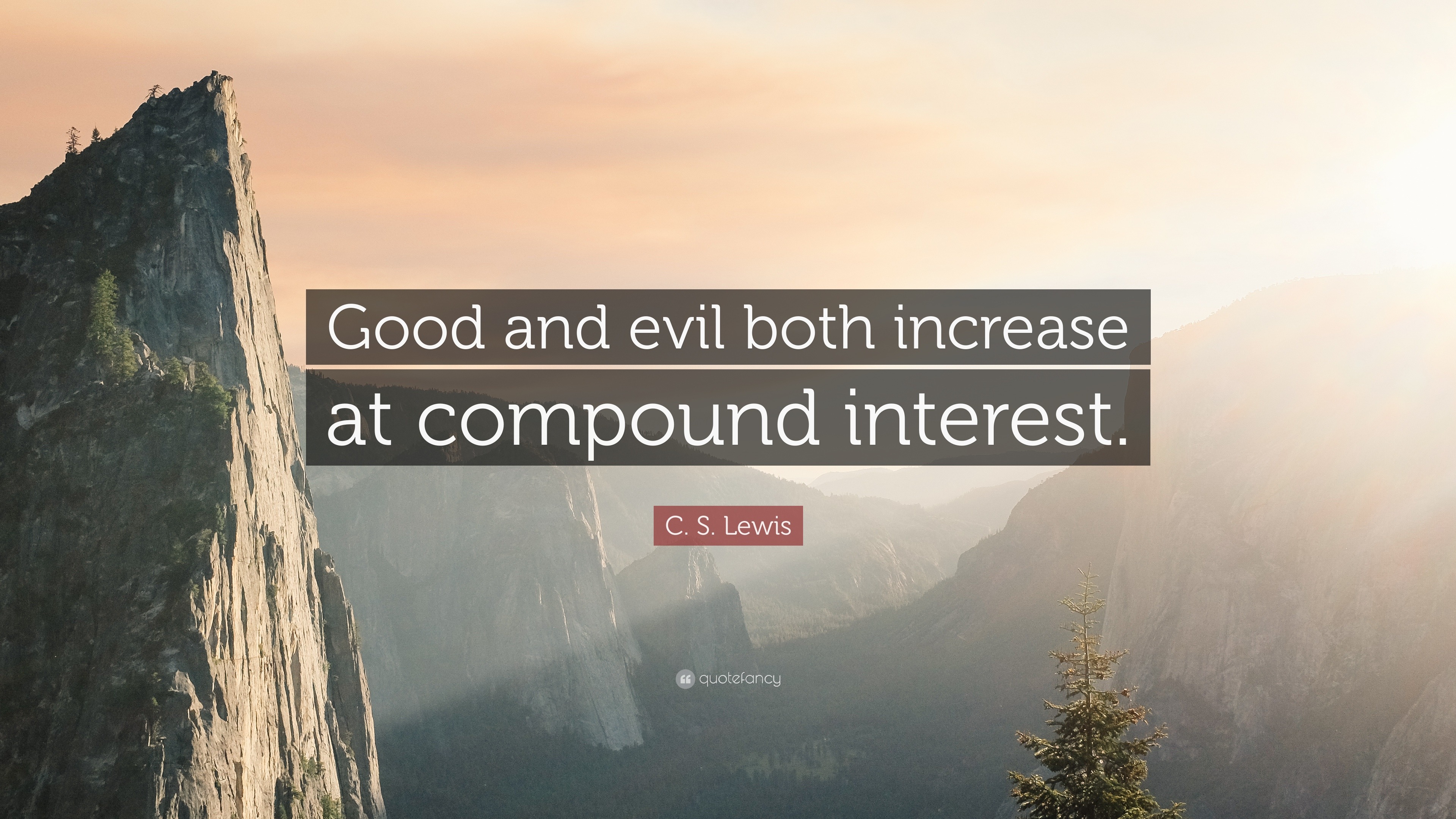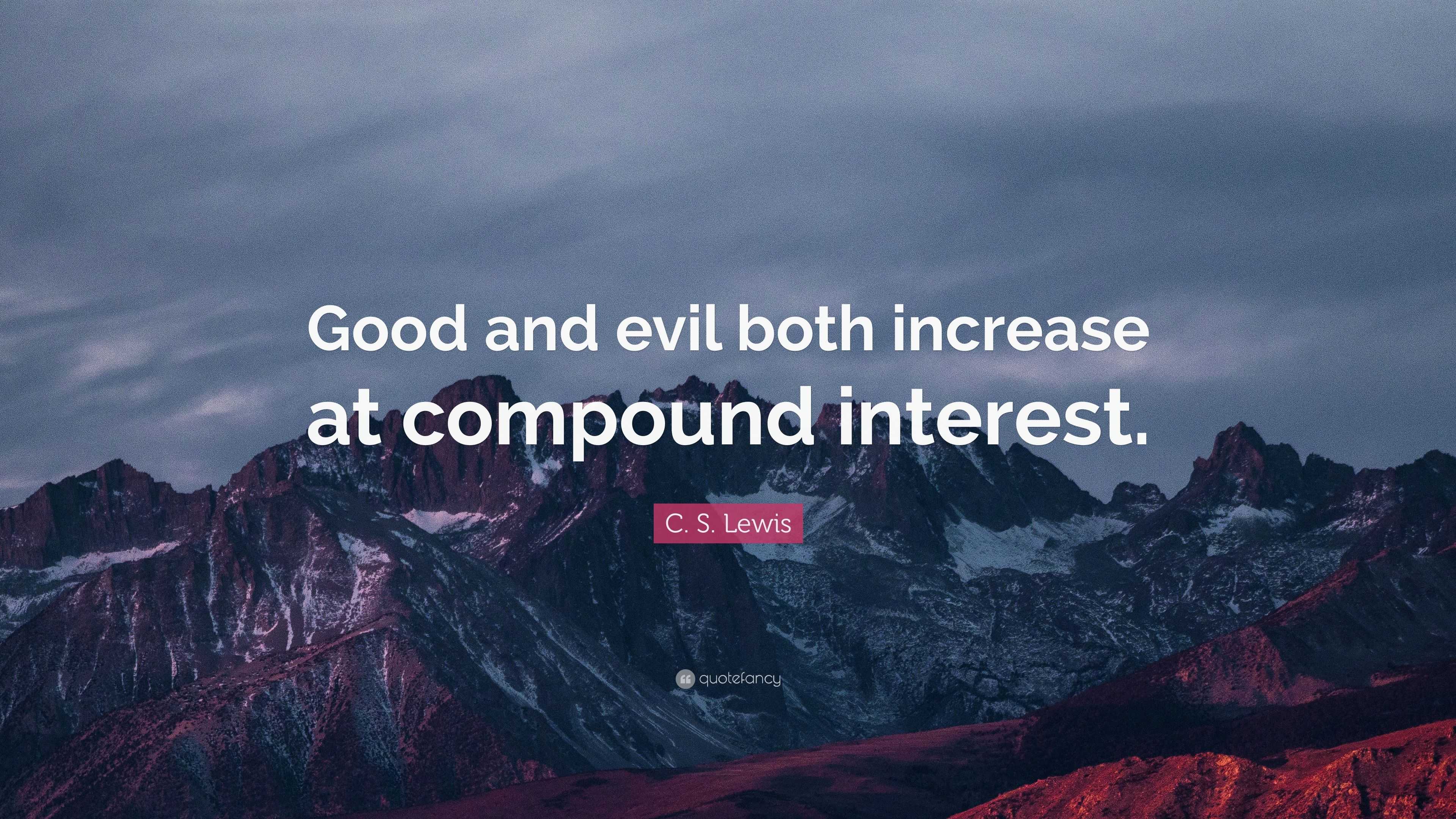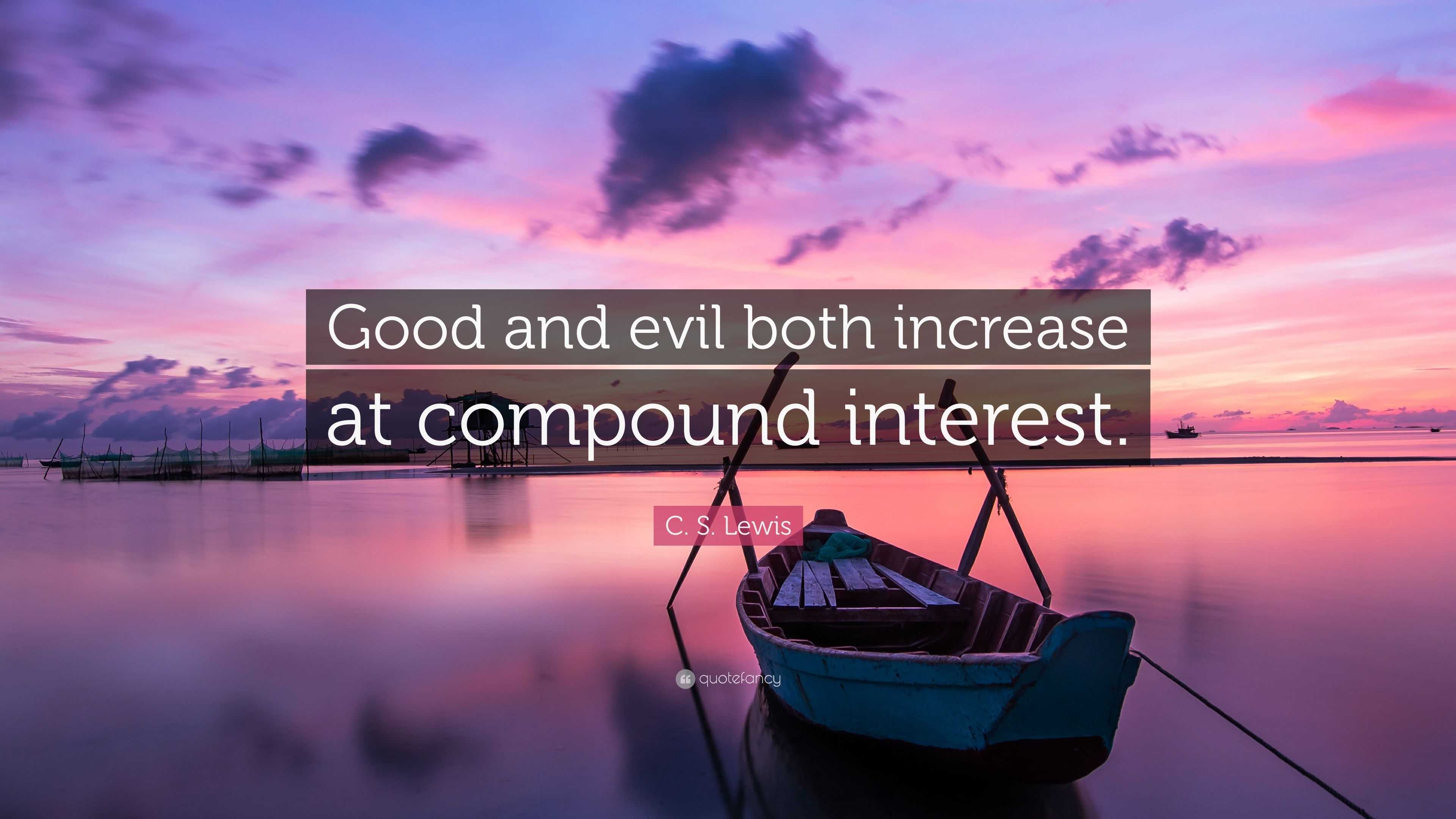Hey there, reader! Let's dive straight into the heart of the matter, shall we? Good and evil both increase at compound interest—this isn't just a philosophical statement; it's a reality that shapes our world in ways we might not even fully comprehend. Think about it for a second. Every action you take, whether big or small, has the potential to snowball into something much larger over time. It's like planting a seed—if you nurture it with care, it grows into something beautiful. But if you let it rot or feed it the wrong nutrients, it could spiral out of control in the worst way possible. So, buckle up, because we're about to explore how this concept plays out in real life and why it matters so much.
This idea isn't new, but it's certainly profound. In fact, it's been floating around for decades, maybe even centuries, in various forms of literature, philosophy, and even economics. The phrase itself suggests a balance—a dualism that exists in every aspect of life. We often hear about the power of compounding in financial terms, but what happens when we apply the same principle to morality, ethics, and human behavior? It’s a mind-blowing concept, right?
Now, I know what you're thinking: "Is this just another preachy article telling me to be good?" Not exactly. What we're exploring here is the intricate dance between good and evil, and how they both grow exponentially depending on the choices we make. It's not just about being "good" all the time—it's about understanding the consequences of every decision, big or small, and how they ripple through time. So, let’s get started, shall we?
- Jade Castrinos Drugs Unraveling The Truth Behind The Headlines
- Christina Hall Nude Understanding The Controversy And The Importance Of Privacy
Understanding the Concept: What Does It Really Mean?
Alright, so let's break it down. When we say good and evil both increase at compound interest, we're talking about the idea that every positive or negative action you take doesn't just stop there. It continues to grow, building on itself over time. Imagine a snowball rolling down a hill—it starts small, but as it picks up speed, it becomes bigger and more powerful. The same goes for your actions. A single act of kindness can inspire others to do the same, creating a ripple effect that spreads far beyond your immediate circle. But, on the flip side, a single act of cruelty can also spiral out of control, leading to more harm than you ever intended.
Here's where it gets interesting: the concept of compound interest isn't just about money. It's about the cumulative effect of repeated actions over time. For example, if you consistently practice kindness, generosity, and empathy, those traits will become more ingrained in your character, leading to even more positive outcomes. Conversely, if you allow negativity, anger, or greed to take root, those emotions can grow stronger, influencing your behavior in ways that might not always align with your values.
It's a powerful reminder that our choices matter—big time. So, how does this concept play out in real life? Let's take a closer look.
- Abby Berner Naked A Comprehensive Look At Privacy Misinformation And Digital Ethics
- Brandi Passante Nude Pics A Comprehensive Analysis And Understanding
Real-Life Examples: How Good and Evil Compound
Case Study: The Power of Positive Actions
Take the story of Malala Yousafzai, for instance. Her decision to stand up for girls' education in the face of immense danger didn't just stop at her. It inspired millions around the world to join her cause, leading to significant changes in global education policies. Her actions compounded over time, creating a movement that continues to grow stronger with each passing year. That's the power of compounding good—when one act of courage inspires countless others to follow suit.
On the flip side, consider the rise of hate groups or extremist organizations. A single act of hate or intolerance can spread like wildfire, leading to more division, fear, and violence. The internet has only accelerated this process, allowing harmful ideologies to reach a wider audience than ever before. It's a stark reminder of how quickly evil can compound if left unchecked.
Why Does This Matter?
Understanding the concept of compounding good and evil is crucial because it affects every aspect of our lives. From personal relationships to global politics, the choices we make have far-reaching consequences. For example, a company that prioritizes ethical business practices over short-term profits might see slower growth initially, but over time, their commitment to doing the right thing can lead to long-term success and trust from their customers. On the other hand, a company that cuts corners or engages in unethical behavior might see quick gains, but those actions can lead to catastrophic consequences down the road.
The Science Behind Compound Interest in Behavior
Now, let's get a little nerdy for a moment. There's actually science behind this concept. Studies in psychology and neuroscience have shown that repeated actions can rewire the brain, making certain behaviors more automatic over time. This is known as neuroplasticity—the brain's ability to adapt and change based on experience. So, when you consistently practice kindness or empathy, your brain starts to prioritize those behaviors, making it easier to act in positive ways in the future. Conversely, when you engage in negative behaviors like anger or resentment, those neural pathways become stronger, making it harder to break free from those patterns.
It's not just about individual behavior, either. Social psychology tells us that humans are inherently social creatures, and our actions often influence those around us. This is known as the "bystander effect" or "social proof"—when people observe others engaging in certain behaviors, they're more likely to follow suit. So, if you're part of a community that values kindness and compassion, those values are more likely to spread throughout the group. But if the community is dominated by negativity or hostility, those emotions can spread just as quickly.
How to Harness the Power of Compound Good
Start Small
One of the most powerful things you can do is start small. You don't have to change the world overnight—just focus on making one positive choice each day. It could be as simple as holding the door open for someone, offering a kind word to a stranger, or volunteering your time to help those in need. The key is consistency. Over time, those small actions will compound, creating a ripple effect that spreads far beyond your immediate circle.
Practice Mindfulness
Mindfulness is another powerful tool for harnessing the power of compound good. By staying present and aware of your thoughts and actions, you can catch negative patterns before they spiral out of control. Meditation, journaling, and other mindfulness practices can help you cultivate a greater sense of awareness, allowing you to make more intentional choices in your daily life.
Surround Yourself with Positivity
Let's face it—negativity can be contagious. But so can positivity! Surrounding yourself with people who uplift and inspire you can make a huge difference in your mindset and behavior. Seek out communities that share your values, whether it's through local groups, online forums, or even social media. When you surround yourself with positivity, it becomes easier to focus on the good and let go of the bad.
Overcoming the Challenges of Compound Evil
Recognizing the Signs
Let's talk about the flip side for a moment. How do you recognize when evil is compounding in your life or in the world around you? One of the biggest signs is when negativity starts to feel normal or even acceptable. If you find yourself constantly engaging in gossip, spreading rumors, or participating in harmful behaviors, it's time to take a step back and reassess. Recognizing these patterns early on is key to breaking free from them before they spiral out of control.
Seeking Support
You don't have to face these challenges alone. Seeking support from friends, family, or even a therapist can make a huge difference in overcoming negative patterns. Sometimes, all it takes is talking to someone who understands what you're going through to gain a fresh perspective and find the strength to make positive changes.
Using Education as a Tool
Education is one of the most powerful tools we have for combating the compounding effects of evil. By educating ourselves and others about the dangers of negativity, intolerance, and hate, we can create a more informed and compassionate society. Whether it's through reading books, attending workshops, or engaging in meaningful conversations, learning is key to breaking the cycle of harm.
Data and Statistics: The Numbers Behind the Phenomenon
Let's look at some numbers to back up this concept. Studies have shown that acts of kindness can increase happiness levels by up to 40%, while engaging in negative behaviors can lead to a 20% increase in stress and anxiety. Additionally, research from the Greater Good Science Center at UC Berkeley found that people who practice gratitude and kindness on a regular basis are more likely to experience positive emotions, stronger relationships, and better overall well-being.
On the flip side, studies on the effects of hate speech and discrimination have shown alarming trends. For example, a report from the Anti-Defamation League found that incidents of hate crimes in the U.S. increased by 12% between 2019 and 2020. This highlights the urgent need to address the compounding effects of evil and work towards creating a more inclusive and compassionate society.
Expert Insights: What the Experts Say
Experts in fields ranging from psychology to economics have weighed in on the concept of compounding good and evil. Dr. Martin Seligman, a pioneer in the field of positive psychology, has emphasized the importance of cultivating positive emotions and behaviors as a way to improve overall well-being. Similarly, economist Robert Shiller has discussed the concept of "behavioral economics," highlighting how human behavior can influence financial markets and societal trends.
In addition to these experts, thought leaders like Brené Brown and Eckhart Tolle have explored the intersection of mindfulness, compassion, and personal growth. Their work underscores the importance of staying present and aware in order to make more intentional choices in our daily lives.
Conclusion: Taking Action
So, there you have it—a deep dive into the concept of good and evil both increase at compound interest. Whether you're inspired to start small, practice mindfulness, or seek out communities of positivity, the key is to take action. Every choice you make has the potential to create a ripple effect that extends far beyond your immediate circle. So, what will you choose today?
As you reflect on this idea, I invite you to leave a comment below sharing your thoughts or experiences. How have you seen the concept of compounding good or evil play out in your own life? Or, if you're feeling inspired, consider sharing this article with a friend or family member who might benefit from these insights. Together, we can create a world where good truly does outweigh evil—one action at a time.
Table of Contents
- Emily Osment Naked Addressing Misinformation And Highlighting Emily Osments Career
- Daniel Sunjata A Journey Through Acting And Activism


